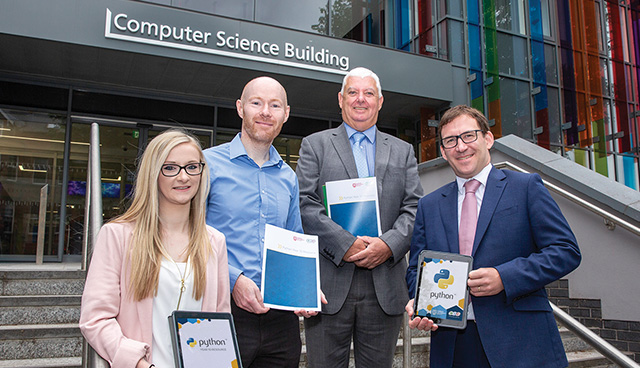Framing the future for digital skills

As demand for digital skills continue to grow, employers want people who are digital creators, particularly people who can make things using digital technology. This is the basis of CCEA’s Digital Framework.
We want young people to leave school with the skills to create things with digital devices. We want them to be able to code and interact with software in a way that adds value. We want them to be ready for employment.
To achieve this, we set about revising and modernising the curriculum and qualifications used by our schools.
The Digital Skills framework
Over the past three years, we have transformed our GCSE and GCE (A/AS-Level) framework. We introduced GCE Software Systems Development, a qualification specifically designed to encourage people to pursue employment in the software industry. We closed GCSE and GCE ICT, replacing it with GCSE and GCE Digital Technology. This has required learners to code in all aspects of digital education.
More and more primary schools are now adopting ‘block based coding’ through Scratch. Research shows that block coding improves confidence in coding and computational thinking with primary school learners.
More recently, we have worked with Minecraft, by developing worlds that introduce problem solving and thinking skills to young people.
We are now finishing our curriculum work, with the introduction of a Key Stage 3 (ages 12 to 14) resource that introduces young people to Python. This provides schools with a resource that helps Year 10 students to develop their current skills whilst encouraging them to continue with their Digital Technology studies at GCSE.
Our approach means there is a clear pathway from primary school through to university.
However, we recognise that there is work needed to help support teachers in the delivery of the curriculum in classrooms. We have worked with industry partners to provide teacher upskilling across both primary and post primary schools. This has included:
• training workshops on computational thinking and coding with Scratch in the primary classroom;
• C# and Python upskilling to support delivery of GCSE Digital Technology (programming); and
• Object Oriented Programming training to support the delivery of GCE Software Systems Development.
Support, from employers and our wider stakeholders, is essential as we continue to support the digital skills development in Northern Ireland.
We also recognise that voluntary groups, such as Coder Dojo, add significant value and are making our coding and digital technology resources available to them.
We look forward to continuing to build a digital skills pathway for all learners, and working in partnership with local government, employers, organisations and our schools.
For more information on our digital skills work, the resources, and how you can be involved visit
W: www.ccea.org.uk/digitalskills






